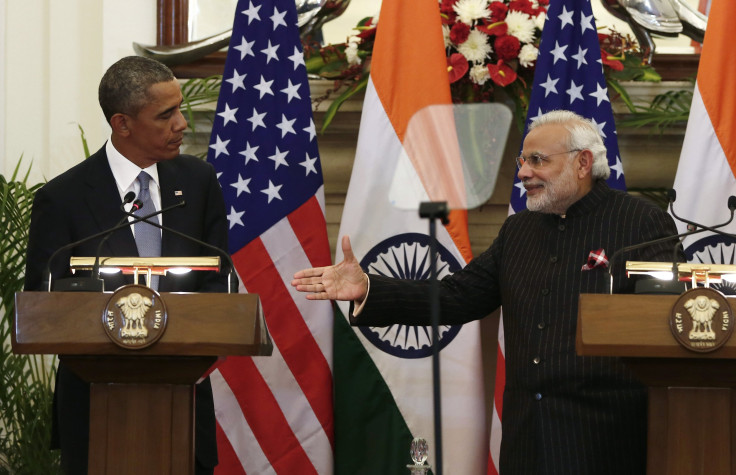India-U.S. Nuclear Agreement: India Clarifies, Says Supplier Not Directly Liable In Case Of A Mishap

NEW DELHI: India on Sunday released some details of an understanding reached with the U.S. last month, which aims to kick-start a long-stalled civilian nuclear cooperation agreement between the two countries.
The country's foreign ministry clarified that in the case of a nuclear accident, a supplier or manufacturer of equipment used to build a nuclear reactor in the country will not be directly liable for damages, but the operator can claim damages from the supplier, if the contract so stipulates.
The two countries had announced a "breakthrough" on the stalled nuclear cooperation agreement Jan. 25, during the visit of U.S. President Barack Obama, who was also the chief guest at the country’s Republic Day celebrations.
Sunday’s details were released as a set of 19 Frequently Asked Questions (FAQs). The government however said that it will not amend its liability law, which has been the primary hurdle in beginning commercial operations under the Indo-U.S. civil nuclear agreement, six years after it was inked.
Curiously, although India’s statement on Sunday said that the two countries had “finalized the text of the Administrative Arrangement to implement” the civil nuclear agreement, newspaper reports have quoted the U.S. Assistant Secretary for South and Central Asian Affairs, Nisha Desai Biswal as saying that the two countries are “still in the process of taking what these top-line commitments were and trading paper to be able to find the more detailed understandings.”
Obama and Indian Prime Minister Narendra Modi had said that the two countries had moved toward breaking a six-year deadlock that has kept a civil nuclear deal between the two nations from being put into action, but no details were released.
Several U.S. companies -- the General Electric Co. and the privately held Westinghouse Electric Co. LLC -- have been looking to establish nuclear power plants in India, pending the implementation of the deal.
It was in July 2005 that the framework for a civil nuclear agreement between the two countries was first broached, as recounted by the South Asian Strategic Stability Institute. Manmohan Singh, then the Indian prime minister, and George W. Bush, then the U.S. president, announced it in a joint statement. The text of the final agreement was released in August 2007. The deal was subsequently cleared by the U.S. Congress in October 2008.
Under the agreement, the U.S. offered India full civil nuclear cooperation after New Delhi agreed to first separate its civilian and military nuclear facilities and then open its civilian reactors to inspections by the International Atomic Energy Agency.
Since its signing, however, the deal has failed to bear fruit. The biggest stumbling blocks have been the liability clauses in a 2010 piece of Indian legislation that have acted to prevent several countries, including the U.S., from selling nuclear reactors to India, according to the government-funded Institute for Defense Studies and Analyses.
It has been interpreted that, the Indian law makes a supplier directly liable in case of a nuclear accident, while other national laws around the world make an operator primarily liable in such an event. If India were to follow global norms, the entire liability in case of an accident would fall upon the Nuclear Power Corp. of India, a government-owned company that operates all the nuclear power plants in the country. Effectively, therefore, the Indian government would be responsible for damages in case of a mishap.
India also wants to form a nuclear insurance pool to cover suppliers of both its existing nuclear plants and the ones that are set up under the several civil nuclear agreements that it has signed.
“... the India Nuclear Insurance Pool has been instituted to facilitate negotiations between the operator and the supplier concerning a right of recourse by providing a source of funds through a market-based mechanism to compensate third parties for nuclear damage. It would enable the suppliers to seek insurance to cover the risk of invocation of recourse against them,” the foreign ministry release noted.
Sunday’s release said that the proposed insurance pool would be of the order of Rs. 15 billion ($250 million). While half this amount would be contributed by the state-owned General Insurance Corp. of India Ltd and four other government owned companies, the remaining half would directly be given by the government “on a tapering basis.”
The U.S. had been insisting on rights to continuously monitor the use of any equipment or material in a U.S.-built reactor even when sourced from a third country. In November, the Times of India reported the U.S. was demanding the “tracking of nuclear fuel through the entire cycle.” There was no mention of this in Sunday’s FAQs.
Ironically, Modi’s own Bharatiya Janata Party had sought a tough liability law while in opposition between 2004 and 2014, when the Indian National Congress party was in office as head of the United Progressive Alliance government, led by former Prime Minister Singh. As IBNLive reported at the time, he virtually staked his coalition government on signing the civil nuclear deal, which had become a contentious political issue in India.
© Copyright IBTimes 2024. All rights reserved.





















